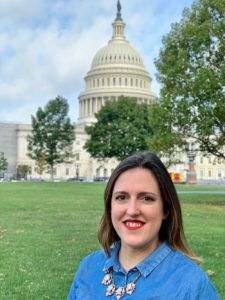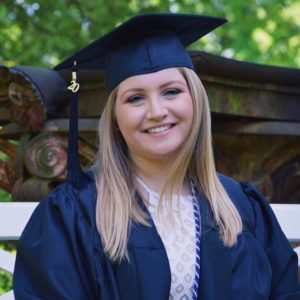Meet Our New Post-Doctoral Affiliate: Erinn Lauterbach
 The Center for Effective Lawmaking is excited to introduce our newest post-doctoral fellow, Erinn Lauterbach. Erinn received her bachelor’s in political science and psychology from Central College, and her master’s and PhD from the University of California, Riverside.
The Center for Effective Lawmaking is excited to introduce our newest post-doctoral fellow, Erinn Lauterbach. Erinn received her bachelor’s in political science and psychology from Central College, and her master’s and PhD from the University of California, Riverside.
Hailing from Iowa, Erinn has always been a “political junkie.” Her interest in political science was solidified when she had the opportunity to study abroad in London, serving as an intern for a member of the British Parliament. Erinn was fascinated by the differences in governance between the United States and England, and quickly determined she wanted to focus her studies on American politics.
After graduating from Central College with her bachelor’s degree in political science and psychology, Erinn spent over two years working on Capitol Hill for Congressman Bruce Braley, who represented her home district in Iowa. Erinn began as a scheduler for Congressman Braley, and shares that she gained valuable insight into the daily operations of a congressional office. She eventually took a position as a legislative aide to Congressman Braley, where she was able to more directly participate in policymaking. After working on the Hill, Erinn knew she wanted to focus her graduate studies on Congress.
Today, Erinn is primarily interested in the study of political institutions and the behavior of elected officials in Congress, as well as how the intersections of different identities may impact the behavior of lawmakers. Her dissertation aims to better understand representation by examining how legislators achieve their policy goals.
At the recommendation of her advisor, Erinn first read Legislative Effectiveness in the United States Congress: The Lawmakers by Wiseman and Volden upon beginning her dissertation research. The book was ever-present on her desk and helped her to hone her measure of policy content. Since reading their book, Erinn knew she wanted to apply for the post-doctoral position at the Center for Effective Lawmaking. Erinn explained that she sees her research on policy content as a “different flavor of effectiveness” that perfectly complements the CEL’s research on legislative effectiveness.
Like Professors Volden and Wiseman, Erinn has created her own measure of policy content to help understand how certain policy tools can help representatives further their legislation in Congress. Erinn applies this measure to understand how political institutions influence legislative success, and how policy content interacts with representative identities and group membership.
Erinn is excited to get started on projects with the CEL. She will be helping to update Legislative Effectiveness Scores with new data aimed at crediting representatives who contribute significantly to legislation proposed by other lawmakers. Because bills are frequently combined and amended, this new information will contribute even more to the precision of our LES. Additionally, Erinn hopes to begin new research combining her measure of policy content with the CEL’s measure of legislative effectiveness to better understand the behaviors of effective lawmakers.
As a post-doctoral fellow at the CEL, Erinn is aiming to absorb as much knowledge as she can from Professors Volden and Wiseman, and hopes to forge meaningful connections with other experts on political institutions and behavior. In the future Erinn hopes to turn her dissertation research into a book, and looks to Wiseman and Volden as inspiration for how she hopes her policy content measure will grow to be used by other scholars and lead to new research in the field of legislative behavior.



